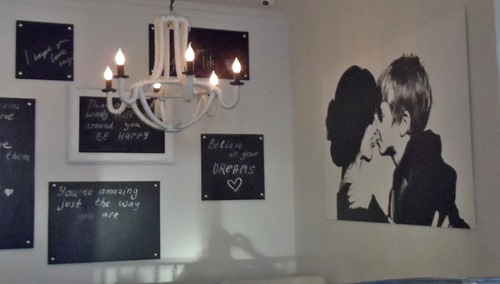
From November 21st to November 28th we’ll be posting writing from Ed Wolf documenting his trip to the Side-By-Side LGBT Film Festival in St. Petersburg. Catch up with Part One, Part Two, Part Three, Part Four, Part Five.
Part Six: Angels Welcome
Monday, November 25th
My hotel room is my safe space. When I close the curtains and write to you, I feel lighter. The terrible situation here can weigh you down; I can see it in the eyes of the people I’m with each day. I went to a supermarket down the street and bought a lot of cookies and I munch on them while I type; there are crumbs everywhere. The room is very warm, the air dry and I have the occasional nosebleed, sometimes a sneezing fit. Earlier I sneezed so many times blood got on my keyboard.
Bard has called. Juliya,another Side by Side volunteer, has offered to be our guide today. We take the subway across the city and meet her at the top of the escalator. Like everyone else, she is young, vibrant and committed to the festival going forward, no matter what the obstacles. She says she’s taking us to St. Isaac’s Cathedral, the largest church in St. Petersburg, and that from the top of the colonnade we’ll be able to see the entire city. We’ve gotten one of the sixty-two sunny days mentioned in the brochure in my room. The sky is flawless, the air clear and very cold. The rain from last night has turned into frozen patches of ice.
We walk very quickly through the streets, crossing bridges over canals, into neighborhoods that look like Amsterdam. When the cathedral appears, it’s massive, like a mountain. We buy a ticket for the colonnade and start climbing up a narrow stairway. Up, up, up. The number one hundred is written on one of the steps and I begin to slow down. I haven’t climbed stairs like this in a long, long time. I can hear my knee surgeons in San Francisco shouting at me. “What are you thinking?”
We hit two hundred, squeeze through a narrow passageway, and we’re suddenly outside, completing the final journey to the top. Two hundred and thirty steps.
And indeed, the view of the city is spectacular. We can see the fast moving Neva River, the Gulf of Finland, dark woods way off in the distance. I feel the longing to see more, to explore what’s out there, but then come back to the situation at hand and why I’m here. I’m struck again by the thoughtfulness of the festival organizers, who have made sure that a volunteer is available so...
You have reached your article limit
Sign up for a digital subscription and continue reading all new issues, plus our entire archives, for just $1.50/month.
Already a subscriber? Sign in




